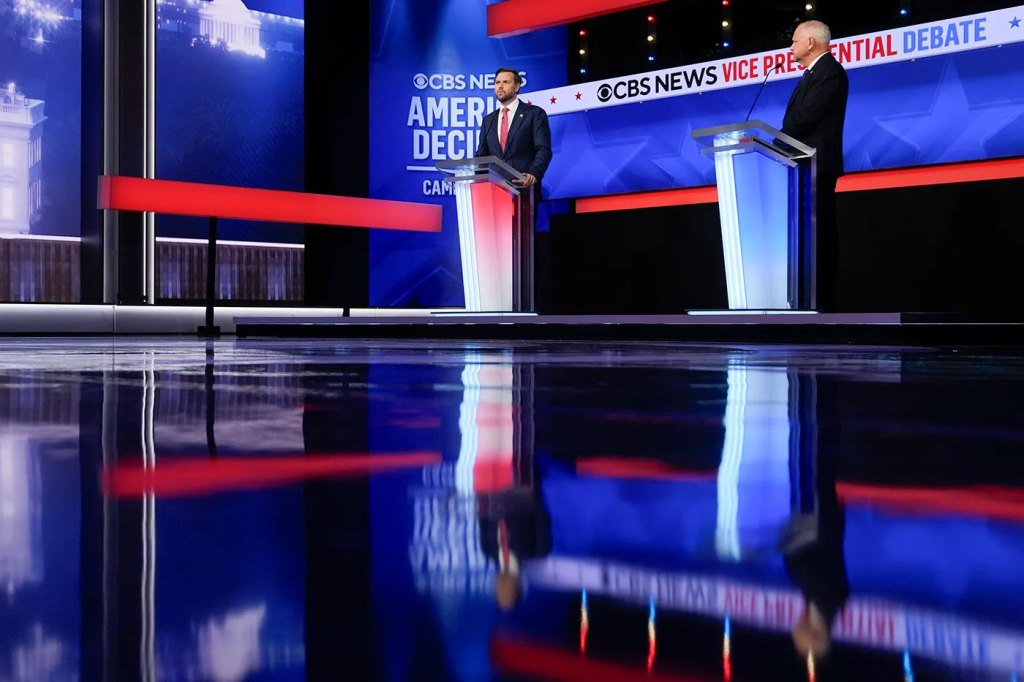Walz-Vance debate reaction: Who came out on top? Hear what the experts had to say
Northeastern political observers say the evening was much more “run-of-the-mill,” civil and policy-focused compared to the pair of presidential debates.

Minnesota Gov. Tim Walz and U.S. Sen. JD Vance squared off Tuesday evening in what experts say was much more “run-of-the-mill,” civil and policy-focused debate compared to the pair of presidential clashes that set a strikingly different tone for the 2024 election.
“This was much more of a standard debate, each candidate trying to reorient each question to their benefit in the usual ways,” says Nick Beauchamp, associate professor of political science at Northeastern University.
“Both candidates kept the focus on the top of the ticket, which makes sense,” says Costas Panagopoulos, distinguished professor of political science at Northeastern University, adding that the pair appeared “very well prepared.”
“Walz repeatedly touted some of his own accomplishments as governor, which will likely be perceived by voters as being more experienced and better prepared to be a heartbeat away from the presidency,” Panagopoulos says. “Vance hardly mentioned his own record at all, to the extent he has one given his limited tenure in public service.”
The debate was hosted by CBS News in New York City. Questions were directed at each candidate, with two minutes to respond and two minutes for rebuttal. Each candidate received an additional minute for clarification. Rather than proceed with microphones, as was the case with the two presidential debates, CBS News kept them on, but reserved the right to mute them in order to “maintain decorum.”
Tuesday’s debate was the final faceoff between the presidential and vice presidential candidates during the 2024 election. It caps one of the more eventful presidential debate cycles to date, one that saw President Joe Biden’s exit from the race following the first presidential debate in June, and subsequently Harris’ rise to a formidable position at the top of the ticket.
The debate also comes amid an intense escalation of fighting in the Middle East after an Israeli ground incursion into southern Lebanon precipitated a barrage of missile strikes from Iran at Israel.
For that reason, the Middle East was the first topic. Both candidates were asked if they would support a preemptive strike on Iran from Israel. Walz, getting off to a slow start, didn’t seem to give a straight answer, using the opportunity to attack Donald Trump instead: “When Iran shot down an aircraft in international airspace, Donald Trump tweeted.”
Vance similarly deflected back to the top of the ticket, noting that Iran is now closer to a nuclear weapon than ever before. He added: “It is up to Israel what they think they need to do to keep their country safe, and we should support our allies.”
It would become a theme of the night: each of the candidates opting to attack their respective running mates rather than each other.
Predictably, the topic of immigration led to one of the longest exchanges of the evening, sparked by the question of whether Trump’s proposed mass deportation plan would separate undocumented immigrant adults from their U.S.-born children.
Vance attacked Harris’ record on the border, then Walz attacked Vance for joining the Republican vote to kill a bipartisan border bill — and for pushing stories about Haitian migrants in Springfield, Ohio.
Barring a moment when moderators Norah O’Donnell and Margaret Brennan cut the microphones after the conversation around immigration went off the rails, the evening was largely tame and mutually respectful, if a touch tense.
Walz dodged a question about his claim that he was in Hong Kong during the Tiananmen Square protests when he wasn’t. “Walz’s answer on Tiananmen was choppy and wishy-washy,” Panagopoulos says.
Toward the end of the debate, Walz came out ahead on the exchange that Panagopoulos says was his best moment: when Walz asked Vance about whether Trump won or lost the 2020 election. Vance ducked in a most odd way, saying that he was focused on the future before going to suggest that Harris was “engaged in censorship at an industrial scale.”
Walz called it “a damning non-answer.”
Abortion yielded few notes, then the candidates cycled to health care. Beauchamp says Walz was clear about the importance of having insurance and being able to take sick time, whereas Vance “was getting bogged down explaining Trump’s positions on Obamacare and what needed fixing.”
“Up until the abortion exchange, Vance was arguably doing a better job on the rhetorical side: many of his answers tended to be more clear, with each answer more clearly focussed around a single value, such as ‘peace through strength’ in the Middle East, or need to reenact Trump’s tough policies on immigration,” Beauchamp says.
The candidates shook hands before and after the debate. At its conclusion, they spoke briefly and were joined by their spouses on stage.
So, who won?
“If the test is who voters would prefer to have a beer with, most would probably pick Walz,” Panagopoulos says.
But he adds: “Vance has been more unflappable and [put] Walz on the defensive more, but also more guileful.”
“While Vance did a certain amount to criticize Harris, it was mostly round-about,” Beauchamp says.
“In general, both candidates were civil, repeatedly praising each other,” Beauchamp says. “That’s both a misrepresentation of their views of each other, and — contrary to those who praise civil discourse above all else — not necessarily the best way to illuminate policies and values to viewers.”
All in all, Panagopoulos says the clash may not move the needle much. Historically, vice presidential debates have little impact on elections.
Both campaigns responded swiftly Tuesday to the developments in the Middle East. Harris reaffirmed her commitment to Israel’s security, and called Iran a “destabilizing, dangerous” force in the Middle East. Trump said Iran would be making a “big mistake” if it attacked Israel.
“I fully support President Biden’s order for the U.S. military to shoot down Iranian missiles targeting Israel,” Harris said, according to Reuters. “Initial indications are that Israel, with our assistance, was able to defeat this attack.”







